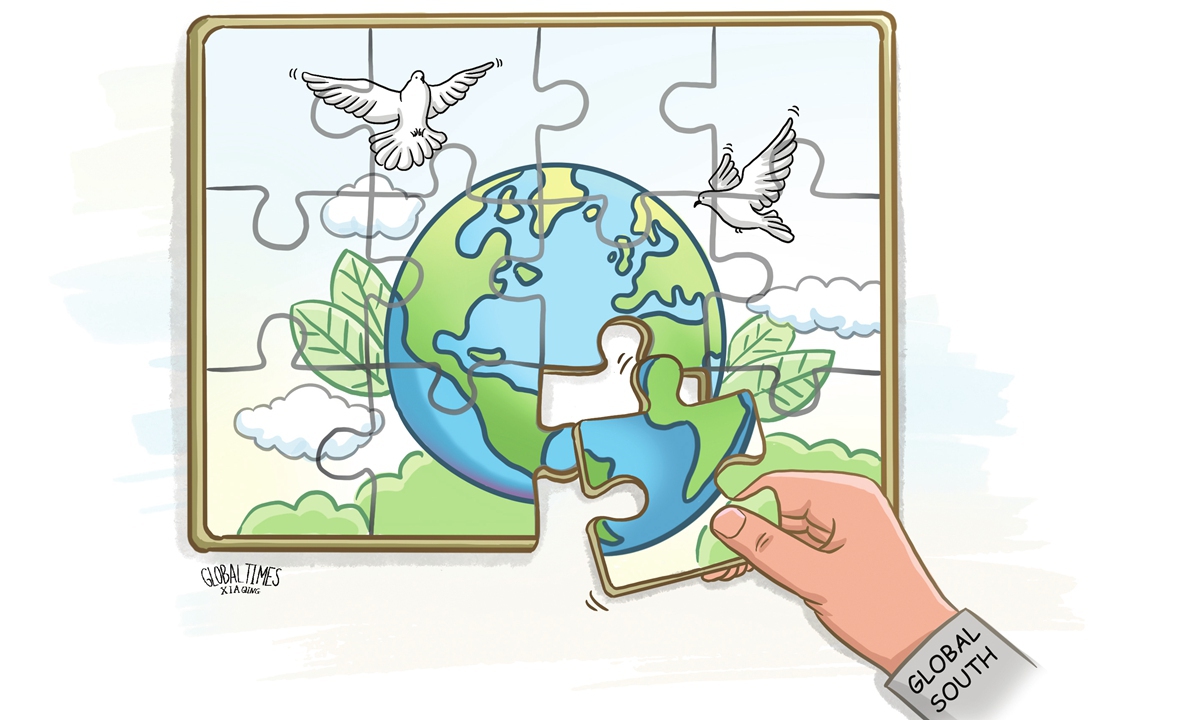
Illustration: Xia Qing/GT
Bangladesh Prime Minister Sheikh Hasina is on her China visit from Monday to Wednesday. It is her fifth visit to China as prime minister and some scholars have noticed that visiting China seems to be among the priorities of the PM's diplomatic missions after winning the election.
Hasina won another historic victory earlier this year in the general election, claiming a fifth term as the country's prime minister. Before the election results were announced, some Western countries questioned the credibility and transparency of the election process. As a traditional friendly partner, China firmly supports the independence and autonomy of Bangladesh's internal affairs and opposes external interference in its elections. However, as an important neighboring country of Bangladesh, India's stance appears to be coming late.
On January 4, Indian Ministry of External Affairs Spokesman Randhir Jaiswal said, "The election in Bangladesh - and we have been very consistently saying this - is the domestic affair of Bangladesh. It is for the people of Bangladesh to decide their future." For Bangladesh, it seems to be not a straight-forward support.
After Hasina won the election, the Indian media had cast their eyes on which country she would choose as her maiden trip. Hasina first attended Modi's swearing-in ceremony with other South Asian leaders and then conducted a separate state visit. The Indian media cheered the decision, believing that Hasina's two visits to India within a month demonstrated the unbreakable friendship between the two countries. It is undeniable that the traditional ties between India and Bangladesh are an important political legacy for the modern diplomatic relations between the two countries.
But Hasina is now in her fifth term, and today's Bangladesh is very different from the past. Economically, Bangladesh has completely overcome the poverty and weakness it faced when it first gained independence. According to the World Bank, since 2000, Bangladesh has remained among the fastest growing economies globally. With the strengthening of national power, Bangladesh values strategic autonomy more than before. Bangladesh is seen as a key player in the Indo-Pacific Strategy, but it maintains its own views on Indo-Pacific awareness and vision, focusing more on economic issues than geopolitical games. In recent years, the international community has seen Hasina's pragmatic approach to handling foreign affairs, believing in Bangladesh's opportunities for development and growth. Bangladesh has maintained good relations with major countries and organizations around the world.
As a traditional friendly partner of Bangladesh, China has always supported the development of Bangladesh. The cornerstone of the rapid development of China-Bangladesh relations is Bangladesh's continued appreciation of China's support for its strategic independence. In August 2023, Chinese President Xi Jinping emphasized during his meeting with Prime Minister Hasina at the BRICS summit in South Africa that China supports Bangladesh in safeguarding national sovereignty, independence and territorial integrity, and in opposing external interference, so that the country can maintain domestic unity and stability and achieve development and revitalization. Hasina, in turn, stated that the sound Bangladesh-China relationship is based on mutual respect and non-interference in each other's internal affairs, and she appreciated China's important role in promoting regional peace and stability.
In recent years, cooperation between the two countries in the fields of economic affairs and trade has developed rapidly. China has been the largest trading partner for Bangladesh for 13 consecutive years. Bilateral trade grew from $3.3 billion from 2009 to 2010 to over $20 billion from 2021 to 2022. Since Bangladesh joined the China-proposed Belt and Road Initiative in 2016, China has invested more than $38 billion in the country. In recent years, investment has surged and diversified. In addition to the economic and trade investment sectors, the two countries are coordinating and cooperating in various fields such as agriculture, fisheries, disaster prevention and relief, maritime affairs, humanities, and multilateral cooperation. Bangladeshi society has welcomed the tangible benefits stemming from cooperation between Bangladesh and China.
Demand for development in Bangladesh is becoming increasingly strong. China has always been willing to share its development experience and achievements with all the other developing countries, including Bangladesh, especially in promoting equal and mutually beneficial cooperation. From Hasina's visit, it can be seen that the development of China-Bangladesh relations is equal, mutually beneficial, and win-win cooperation. Additionally, cooperation between the two countries is of significance for the common prosperity and development of all developing countries in the Global South.
The author is an expert in South Asian Studies at Communication University of China. opinion@globaltimes.com.cn



